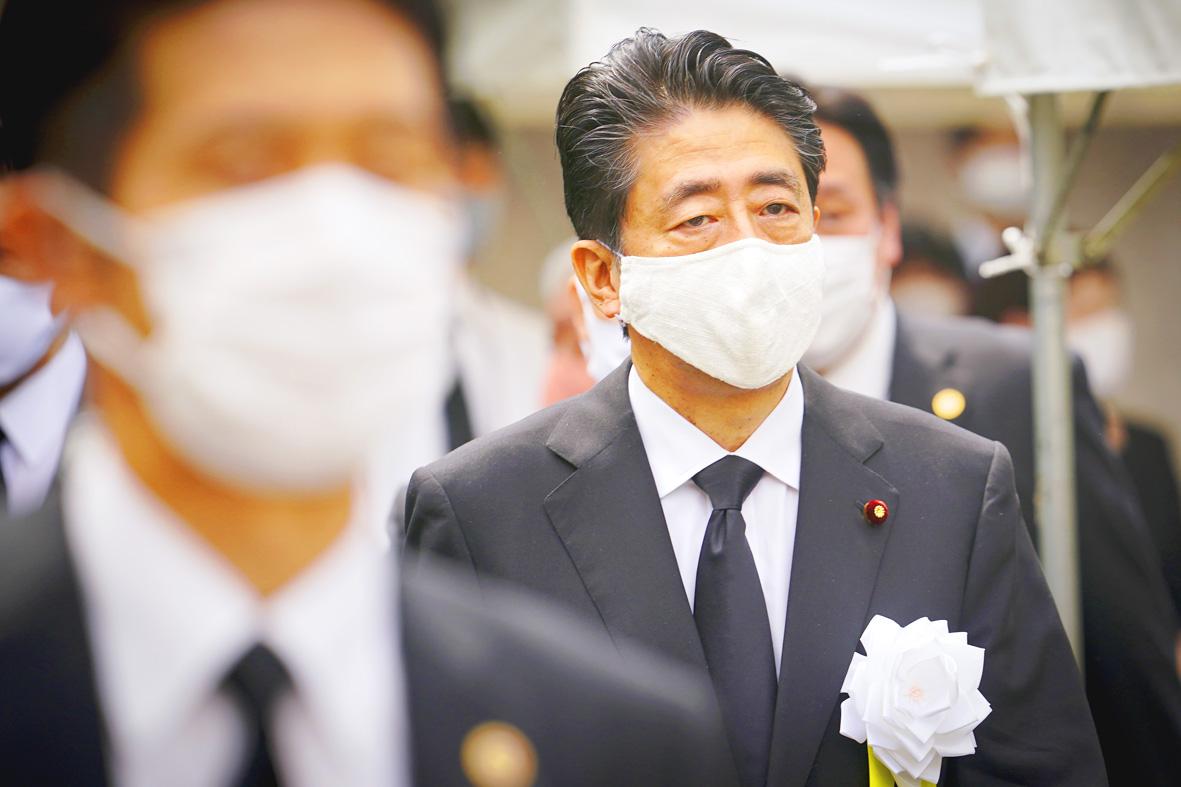Japanese Prime Minister Shinzo Abe yesterday visited a Tokyo hospital after his avoidance of extended public appearances sparked speculation about the health of the country’s longest-serving premier.
Abe, 65, was seen arriving by car at Keio University Hospital in Tokyo, in video broadcast by Japanese television networks.
He was going to undergo a one-day health checkup, Kyodo News cited an aide as saying, while broadcaster TBS said that he had undergone a full health examination as recently as June.

Photo: EPA-EFE
There was no plan for him to be admitted to the hospital, Fuji News Network said.
The Japanese Prime Minister’s Office has not put out an official statement on the matter.
Abe has not held a full-length news conference since mid-June, and has rebuffed opposition calls for a new session of parliament to debate policies for controlling the COVID-19 outbreak and its economic fallout.
Domestic media have kept a close eye on Abe’s movements, saying that he paid his first visit in months to a gym on Aug. 10.
TBS even took to timing his daily walk across the foyer of his residence in a bid to gauge the state of his health.
Abe resigned in 2007 after an abbreviated first term in office, citing a worsening of chronic ulcerative colitis.
When he made a comeback in 2012 that started his current run as prime minister, aides said the introduction of a new drug had enabled him to bring the condition under control.
Japanese Chief Cabinet Secretary Yoshihide Suga, who works closely with Abe on a daily basis, said on Aug. 4 he did not believe there was any problem with the prime minister’s health.
Abe has had little time away from work as COVID-19 continues to spread throughout Japan, triggering the worst economic contraction on record in the April-to-June quarter.
As virus numbers have increased in the past few weeks, his approval slid to a record low of 35.4 percent in a poll published by Japan News Network earlier this month.

Former Nicaraguan president Violeta Chamorro, who brought peace to Nicaragua after years of war and was the first woman elected president in the Americas, died on Saturday at the age of 95, her family said. Chamorro, who ruled the poor Central American country from 1990 to 1997, “died in peace, surrounded by the affection and love of her children,” said a statement issued by her four children. As president, Chamorro ended a civil war that had raged for much of the 1980s as US-backed rebels known as the “Contras” fought the leftist Sandinista government. That conflict made Nicaragua one of

COMPETITION: The US and Russia make up about 90 percent of the world stockpile and are adding new versions, while China’s nuclear force is steadily rising, SIPRI said Most of the world’s nuclear-armed states continued to modernize their arsenals last year, setting the stage for a new nuclear arms race, the Stockholm International Peace Research Institute (SIPRI) said yesterday. Nuclear powers including the US and Russia — which account for about 90 percent of the world’s stockpile — had spent time last year “upgrading existing weapons and adding newer versions,” researchers said. Since the end of the Cold War, old warheads have generally been dismantled quicker than new ones have been deployed, resulting in a decrease in the overall number of warheads. However, SIPRI said that the trend was likely

BOMBARDMENT: Moscow sent more than 440 drones and 32 missiles, Volodymyr Zelenskiy said, in ‘one of the most terrifying strikes’ on the capital in recent months A nighttime Russian missile and drone bombardment of Ukraine killed at least 15 people and injured 116 while they slept in their homes, local officials said yesterday, with the main barrage centering on the capital, Kyiv. Kyiv City Military Administration head Tymur Tkachenko said 14 people were killed and 99 were injured as explosions echoed across the city for hours during the night. The bombardment demolished a nine-story residential building, destroying dozens of apartments. Emergency workers were at the scene to rescue people from under the rubble. Russia flung more than 440 drones and 32 missiles at Ukraine, Ukrainian President Volodymyr Zelenskiy

Indonesia’s Mount Lewotobi Laki-Laki yesterday erupted again with giant ash and smoke plumes after forcing evacuations of villages and flight cancelations, including to and from the resort island of Bali. Several eruptions sent ash up to 5km into the sky on Tuesday evening to yesterday afternoon. An eruption on Tuesday afternoon sent thick, gray clouds 10km into the sky that expanded into a mushroom-shaped ash cloud visible as much as 150km kilometers away. The eruption alert was raised on Tuesday to the highest level and the danger zone where people are recommended to leave was expanded to 8km from the crater. Officers also